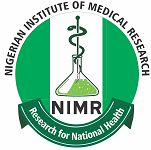Nigerian Institute of Medical Research (NIMR) has unveiled the first SARS-CoV-2 Isothemal Molecular Assay (SIMA) kit in the country to boost COVID-19 testing capacity.
Speaking at the unveiling, Professor Babatunde Salako, Director General of NIMR, said the testing kit was developed to ease the challenges posed by the current method which required heavy laboratory and expensive equipment to function.
Salako said SIMA testing kit is a fast and sensitive point of carebtest for COVID-19 infection using molecular technique that is reliable.
“As a foremost research institute in Nigeria with a mandate to conduct research into diseases of public health importance like COVID-19 pandemic which at present a difficult management challenge for scientists. While no effective vaccine has been developed till date, case detection remains the surest way of controlling the pandemic. Seeing that molecular laboratories remain limited in number and remote areas are at disadvantaged in getting tested and limited testing centres. Our researchers once again swung into action to develop a point of care molecular test for COVID-19 to ease the challenges of getting a molecular laboratory which requires huge fund. The Isothemal used for our point of care testing cost 9500 dollars which is cheaper than the regular real time PCR equipment which cost about 100,000 dollars. This test reagent can be produced in country with 80 per cent to 90 per cent locally sourced material,”.
According to him, a NIMR research team, led by Dr Chika Onwuamah, a Senior Research Scientist, developed a molecular test for coronavirus that gives test result in less than 40 minutes.
He thanked Fate Foundation, for supporting the research with N20million through its Fate Philanthropy Coalition for COVID-19 Support.
“We are very grateful for the support given to the institute to develop the assay which is not only first of its kind in the country but also in Africa. The objective of the grant was to develop a fast multiplex isothermal assay for SARS-CoV-2 while we also designed and evaluated primers and probes for multiplex. Work is currently ongoing on a simple release reagent to simplify the RNA extraction step and the assay development procedure involve both bioinformatic analysis designing the primers and probes. To date, we have a working assay guaranted to test 100 copies/ml of SARs-CoV-2 RNA, as we continue to improve on the detection limit,”.
Dr Onwuamah, who led the research work, said SIMA was far cheaper and faster compared to PCR which required a lot of power and goes through different temperature.
“The difference between the PCR used in Molecular lab and this is that PCR goes through different circle of temperature which requires a lot more of power for heating and cooling. SIMA works at one temperature and that is why it is called isothermal which makes it far cheaper and faster,”.
On the duration of the research, the Senior Researcher said the project started around May, noting that there was a bit of delay due to COVID-19 induced lockdown.
Onwuamah, however, called for more support to aid scientists in the country to carryout research work on public health emergency such as COVID-19.
“Support for scientists in Nigeria need to be strong because we have a lot to give but the enabling environment is not visible. This research work cost close to N10million before we arrive here and it is a continuous thing because we have to keep improving on what we have developed,”.
Mrs Adenike Adeyemi, Executive Director of Fate Foundation, said the foundation established the support fund to assist the ongoing national and local efforts to strengthen public health infrastructure.
Adeyemi said the focus was to key into government effort to properly equip and support public health facilities and frontline health workers.
“This foundation was founded 20 years ago by Fola Ade with a goal to enable aspiring and emerging Nigerians to excel in their prospective fields. The foundation has supported in the fight against the ravishing pandemic through our various programmes and with the support of 61 individual donors and institute. We are happy to be part of this huge research development that will go a long way to ease some of the present challenges in the fight against the virus,”.

